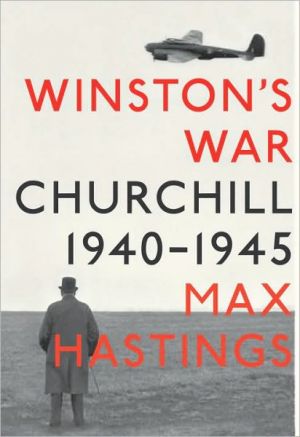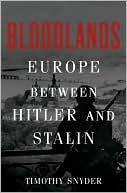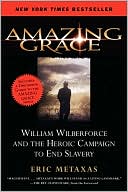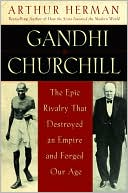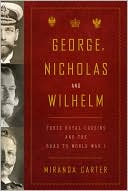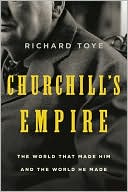Winston's War: Churchill, 1940-1945
Winston’s War is a vivid and incisive portrait of Winston Churchill during wartime. Here are the glories and triumphs, the contradictions and blunders of the man who, through sheer force of will, kept Britain fighting in 1940. But as the tide of the war turned, historian Max Hastings shows how Churchill was often disappointed by the failure of the British Army to match his hopes on the battlefield, and by the difficulties of sustaining the wartime alliance not only with the Soviet...
Search in google:
From our foremost historian of World War II, a vivid and incisive portrait of Winston Churchill during wartime.With unparalleled insight, Max Hastings brings to life the man and his complexities, giving us a penetrating analysis of Churchill s relationship with his nation, its allies, and its armed forces. He captures Churchill s galvanizing courage in the face of certain defeat and his brilliant and prescient wooing of President Roosevelt at a time when most British citizens and their leaders disliked the Americans. Hastings also explores Churchill s shortcomings, detailing how he nearly squandered the British troops miraculous escape at Dunkirk, illuminating how he failed to address fundamental flaws in the army, and exploring the disastrous consequences of several key decisions. Here is Churchill in all his private anxieties and inspiring public confidence, his tactical misjudgments and his strategic successes, his stubbornness and his... The Barnes & Noble Review Churchill got many little things wrong, but he was right, crucially so, on major points of Allied strategy. When the Americans joined the war, they were hot to invade France. Churchill dissuaded Roosevelt from mounting what, in 1942 or 1943, would have most likely been a suicide mission, and redirected Allied attention to North Africa and Italy. The Mediterranean campaign bore mixed results, but Churchill's instincts were correct. There is a poignant ambiguity about Hastings's title; after 1943, the conflict was anything but Winston's war. For a time, Churchill alone had embodied the West's hopes; but as the war turned in the Allies' favor, he was shunted aside. Roosevelt ignored his advice, and, to Churchill's horror, signed off on Stalin's subjugation of Eastern Europe. In these last years, we see a much diminished war leader. He fretted endlessly about D-Day -- "This battle has been forced upon us by the Russians and the United States military authorities," he complained in April 1944 -- and fixated on invading the Balkans. Churchill deserves our admiration; first however, as Hastings wisely insists, "history must take Churchill as a whole."
Introduction\ Churchill was the greatest Englishman and one of the greatest human beings of the twentieth century, indeed of all time. Yet, beyond that bald assertion, there are infinite nuances in considering his conduct of Britain’s war between 1940 and 1945, which is the theme of this book. It originated nine years ago, when Roy Jenkins was writing his biography of Churchill. Roy flattered me by inviting my comments on the typescript, chapter by chapter. Some of my suggestions he accepted; many he sensibly ignored.\ When we reached the Second World War, his patience expired. Exasperated by the profusion of my strictures, he said: “You’re trying to get me to do something which you should write yourself, if you want to!” By that time, his health was failing. He was impatient to finish his own book, which achieved triumphant success before his death.\ In the years which followed, I thought much about Churchill and the war, mindful of some Boswellian lines about Samuel Johnson: “He had once conceived the thought of writing The Life Of Oliver Crom - well . . . He at length laid aside his scheme, on discovering that all that can be told of him is already in print; and that it is impracticable to procure any authentick information in addition to what the world is already possessed of.” Among the vast Churchillian bibliography, I was especially apprehensive about venturing anywhere near the tracks of David Reynolds’s extraordinarily original and penetrating 2005 In Command of History. The author dissected successive drafts of Churchill’s war memoirs, exposing contrasts between judgements on people and events which the old statesman initially proposed to make, and those which he finally deemed it prudent to publish. Andrew Roberts has painted a striking portrait of wartime Anglo-American relations in his 2009 Masters and Commanders. We have been told more about Winston Churchill than any other human being. Tens of thousands of people of many nations have recorded even trifling encounters, noting every word which they heard him utter. The most vivid wartime memory of one soldier of Britain’s Eighth Army derived from a day in 1942 when he found the prime minister his neighbour in a North African desert latrine. Churchill’s speeches and writings fill many volumes.\ Yet much remains opaque, because he wished it thus. Always mindful of his role as a stellar performer upon the stage of history, he became supremely so after May 10, 1940. He kept no diary because, he observed, to do so would be to expose his follies and inconsistencies to posterity.Within months of his ascent to the premiership, however, he told his staff that he had already schemed the chapters of the book which he would write as soon as the war was over. The outcome was a ruthlessly partial six-volume work which is poor history, if sometimes peerless prose. We shall never know with complete confidence what he thought about many personalities—for instance Roosevelt, Eisenhower, Brooke, King George VI, his Cabinet colleagues—because he took good care not to tell us.\ Churchill’s wartime relationship with the British people was much more complex than is often acknowledged. Few denied his claims upon the premiership. But between the end of the Battle of Britain in 1940 and El Alamein in November 1942, not only many ordinary citizens, but also some of his closest colleagues wanted operational control of the war machine to be removed from his hands, and some other figure appointed to his role as minister of defence. It is hard to overstate the embarrassment and even shame of the British people, as they perceived the Russians playing a heroic part in the struggle against Nazism, while their own army seemed incapable of winning a battle. To understand Britain’s wartime experience, it appears essential to recognise, as some narratives do not, the sense of humiliation which afflicted Britain amid the failures of its soldiers, contrasted—albeit often on the basis of wildly false information—with the achievements of Stalin.\ Churchill was dismayed by the performance of the British Army, even after victories began to come at the end of 1942. Himself a hero, he expected others likewise to show themselves heroes. In 1940, the people of Britain, together with their navy and air force, wonderfully fulfilled his hopes. Thereafter, however, much of the story of Britain’s part in the war seems to me that of the prime minister seeking more from his nation’s warriors than they could deliver. The failure of the army to match the prime minister’s aspirations is among the central themes of this book.\ Much discussion of Britain’s military effort in World War II focuses upon Churchill’s relationship with his generals. In my view, this preoccupation is overdone. The difficulties of fighting the Germans and Japanese went much deeper than could be solved by changes of commanders. The British were beaten again and again between 1940 and 1942, and continued to suffer battlefield difficulties thereafter, in consequence of failures of tactics, weapons, equipment and culture even more significant than lack of mass or inspired leadership. The gulf between Churchillian aspiration and reality extended to the peoples of occupied Europe, hence his faith in “setting Europe ablaze” through the agency of Special Operations Executive, which had malign consequences that he failed to anticipate. SOE armed some occupied peoples to fight more energetically against one another in 1944–45 than they had done earlier against the Germans.\ It is a common mistake to suppose that those who bestrode the stage during momentous times were giants, set apart from the personalities of our own humdrum society. I have argued in earlier books that we should instead see 1939–45 as a period when men and women not much different from ourselves strove to grapple with stresses and responsibilities which stretched their powers to the limit. Churchill was one of a tiny number of actors who proved worthy of the role in which destiny cast him. Those who worked for the prime minister, indeed the British people at war, served as a supporting cast, seeking honourably but sometimes inadequately to play their own parts in the wake of a titan.\ Sir Edward Bridges, then cabinet secretary, wrote of Churchill between 1940 and 1942: “Everything depended upon him and him alone. Only he had the power to make the nation believe that it could win.” This remains the view of most of the world, almost seventy years later. Yet there is also no shortage of iconoclasts. In a recent biography Cambridge lecturer Nigel Knight writes contemptuously of Churchill: “He was not mad or simple; his misguided decisions were a product of his personality—a mixture of arrogance, emotion, self-indulgence, stubbornness and a blind faith in his own ability.” Another modern biographer, Chris Wrigley, suggests that Sir Edward Bridges’s tribute to Churchill “may overstate his indispensability.”\ Such strictures seem otiose to those of us convinced that, in his absence, Britain would have made terms with Hitler after Dunkirk.\ Thereafter, beyond his domestic achievement as war leader, he performed a diplomatic role of which only he was capable: as suitor of the United States on behalf of the British nation. To fulfil this, he was obliged to overcome intense prejudices on both sides of the Atlantic. So extravagant was Churchill’s—and Roosevelt’s—wartime rhetoric about the Anglo-American alliance that even today the extent of mutual suspicion and indeed dislike between the two peoples is often underestimated. The British ruling class, in particular, condescended amazingly towards Americans.\ In 1940–41, Winston Churchill perceived, with a clarity which eluded some of his fellow countrymen, that only American belligerence might open a path to victory. Pearl Harbor, and not the prime minister’s powers of seduction, eventually brought Roosevelt’s nation into the war. But no other statesman could have conducted British policy towards the United States with such consummate skill, nor have achieved such personal influence upon the American people. This persisted until 1944, when his standing in the United States declined precipitously, to revive only when the onset of the Cold War caused many Americans to hail Churchill as a prophet. His greatness, which had come to seem too large for his own impoverished country, then became perceived as a shared Anglo- American treasure.\ From June 1941 onwards, Churchill saw much more clearly than most British soldiers and politicians that Russia must be embraced as an ally. But it seems important to strip away legends about aid to the Soviet Union, and acknowledge how small this was in the decisive 1941–42 period. Stalin’s nation saved itself with little help from the Western Allies. Only from mid- 1943 onwards did supplies to Russia gain critical mass, and Anglo- American ground operations absorb a significant part of the Wehrmacht’s attention.\ The huge popularity of the Soviet Union in wartime Britain was a source of dismay, indeed exasperation, to the small number of people at the top who knew the truth about the barbarity of Stalin’s regime, its implacable hostility to the West and its imperialistic designs on eastern Europe. The divide between the sentiments of the public and those of the prime minister towards the Soviet Union became a chasm in May 1945. One of Churchill’s most astonishing acts, in the last weeks of his premiership, was to order the Joint Planning Staff to produce a draft for Operation Unthinkable. The resulting document considered the practicability of launching an Anglo- American offensive against the Russians, with forty-seven divisions reinforced by the remains of Hitler’s Wehrmacht, to restore the freedom of Poland. Though Churchill acknowledged this as a remote contingency, it is remarkable that he caused the Chiefs of Staff to address it at all.\ I am surprised how few historians seem to notice that many things which the British and Americans believed they were concealing from the Soviets—for instance, Bletchley Park’s penetration of Axis ciphers and Anglo-American arguments about launching a Second Front—were wellknown to Stalin, through the good offices of Communist sympathisers and traitors in Whitehall and Washington. The Soviets knew vastly more about their allies’ secret policy making than did the British and Americans about that of the Russians.\ It is fascinating to study public mood swings through wartime British, American and Russian newspapers and the diaries of ordinary citizens. These often give a very different picture from that of historians, with their privileged knowledge of how the story ended. As for sentiment at the top, some men who were indifferent politicians or commanders contributed much more as contemporary chroniclers. The diaries of such figures as Hugh Dalton, Leo Amery and Lt. Gen. Henry Pownall make them more valuable to us as eyewitnesses and eavesdroppers than they seemed to their contemporaries as players in the drama.\ Maj. Gen. John Kennedy, for much of the war the British Army’s director of military operations, kept a diary which arguably ranks second only to that of Gen. Sir Alan Brooke for its insights into the British military high command. On January 26, 1941, in the darkest days of the conflict, Kennedy expressed a fear that selective use of accounts of the meetings of Britain’s leaders might mislead posterity:\ It would be easy by a cunning or biased selection of evidence to give the impression for instance that the P.M.’s strategic policy was nearly always at fault, & that it was only by terrific efforts that he is kept on the right lines—and it would be easy to do likewise with all the chiefs of staff. The historian who has to deal with the voluminous records of this war will have a frightful task. I suppose no war has been so well documented. Yet the records do not often reveal individual views. It is essentially a government of committees . . . Winston is of course the dominating personality & he has in his entourage and among his immediate advisers no really strong personality. Yet Winston’s views do not often prevail if they are contrary to the general trend of opinion among the service staffs. Minutes flutter continually from Winston’s typewriter on every conceivable subject. His strategic imagination is inexhaustible and many of his ideas are wild and unsound and impracticable. . . but in the end they are killed if they are not acceptable.\ These observations, made in the heat of events, deserve respect from every historian of the period. Another banal and yet critical point is that circumstances and attitudes shifted. The prime minister often changed his mind, and deserves more credit than he sometimes receives for his willingness to do so. Meanwhile, others vacillated in their views of him. Some who revered Churchill in the first months of his premiership later became bitterly sceptical, and vice versa. After Dunkirk, Britain’s middle classes were considerably more staunch than some members of its traditional ruling caste, partly because they knew less about the full horror of the country’s predicament. History perceives as pivotal Britain’s survival through 1940, so that the weariness and cynicism which pervaded the country by 1942, amid continuing defeats, are often underrated. Industrial unrest, manifested through strikes especially in the coalfields and in the aircraft and shipbuilding industries, revealed fissures in the fabric of national unity which are surprisingly seldom acknowledged.\ This book does not seek to retell the full story of Churchill at war, but rather to present a portrait of his leadership from the day on which he became prime minister, May 10, 1940, set in the context of Britain’s national experience. It is weighted towards the first half of the conflict, partly because Churchill’s contribution was then much greater than it became later, and partly because I have sought to emphasise issues and events about which there seem new things to be said.\ I have written relatively little in this book about the strategic air offensive, having addressed this earlier in Bomber Command and Armageddon. I have here confined myself to discussion of the prime minister’s personal role in key bombing decisions. I have not described land and naval campaigns in detail, but instead considered the institutional cultures which influenced the performance of the British Army, the Royal Navy and the Royal Air Force (RAF), and the three services’ relationships with the prime minister.\ To maintain coherence, it is necessary to address some themes and episodes which are familiar, though specific aspects deserve reconsideration. There was, for instance, what I have called the second Dunkirk, no less miraculous than the first. Churchill’s biggest misjudgement of 1940 was his decision to send more troops to France in June after the rescue of the British Expeditionary Force (BEF) from the beaches. Only the stubborn insistence of their commander, Lt. Gen. Sir Alan Brooke, made it possible to overcome the rash impulses of the prime minister and evacuate almost 200,000 men who would otherwise have been lost.\ The narrative examines some subordinate issues and events in which the prime minister’s role was crucial, such as the strategic contribution of SOE (as distinct from romantic tales of its agents’ derring- do), the Dodecanese campaign and Churchill’s Athens adventure in December 1944. I have attempted little original research in his own papers. Instead, I have explored the impression he made upon others—generals, soldiers, citizens, Americans and Russians. Moscow’s closure of key archives to foreign researchers has curtailed the wonderful bonanza of the post–Cold War period. But much important material has now been published in Russian documentary collections.\ It seems mistaken to stint on quotation from Alan Brooke, John Colville and Charles Wilson (Lord Moran), merely because their records have been long in the public domain. Recent research on Moran’s manuscript suggests that, rather than being a true contemporary record, much of it was written up afterwards. Yet most of his anecdotes and observations appear credible. The diaries of Churchill’s military chief, junior private secretary and doctor provide, for all their various limitations, the most intimate testimony we shall ever have about Churchill’s wartime existence.\ He himself, of course, bestrides the tale in all his joyous splendour. Even at the blackest periods, when his spirits sagged, flashes of exuberance broke through, which cheered his colleagues and contemporaries, but caused some people to recoil from him. They were dismayed, even disgusted, that he so conspicuously thrilled to his own part in the greatest conflict in human history. “Why do we regard history as of the past and forget we are making it?” he exulted to Australian prime minister Robert Menzies in 1941. It was this glee which caused such a man as the aesthete and diarist James Lees- Milne to write fastidiously after it was all over:\ “Churchill so evidently enjoyed the war that I could never like him. I merely acknowledge him, like Genghis Khan, to have been great.”\ Lees-Milne and like-minded critics missed an important aspect of Churchill’s attitude to conflict in general, and to the Second World War in particular. He thrilled to the cannon’s roar, and rejoiced in its proximity to himself. Yet never for a moment did he lose his sense of dismay about the death and destruction which war visited upon the innocent. “Ah, horrible war, amazing medley of the glorious and the squalid, the pitiful and the sublime,” he wrote as a correspondent in South Africa in January 1900. “If modern men of light and leading saw your face closer simple folk would see it hardly ever.” Hitler was indifferent to the sufferings his policies imposed upon mankind. Churchill never flinched from the necessity to pay in blood for the defeat of Nazi tyranny. But his sole purpose was to enable the guns to be silenced, the peoples of the world restored to their peaceful lives.\ Appetite for the fray was among Churchill’s most convincing credentials for national leadership in May 1940. Neville Chamberlain had many weaknesses as prime minister, but foremost among them was a revulsion from the conflict to which his country was committed, shared by many members of his government. One of them, Rob Bernays, said: “I wish I were twenty. I cannot bear this responsibility.” A nation which found itself committed to a life- and- death struggle against one of the most ruthless tyrannies in history was surely wise to entrust its leadership to a man eager to embrace the role, rather than one who shrank from it. This book discusses Churchill’s follies and misjudgements, which were many and various. But these are as pimples upon the mountain of his achievement. It is sometimes said that the British and American peoples are still today, in the twenty-first century, indecently obsessed with the Second World War. The reason is not far to seek. We know that here was something which our parents and grandparents did well, in a noble cause that will forever be identified with the person of Winston Churchill, warlord extraordinary.\ Chilton Foliat, Berkshire January 2009
List of Maps xi\ Introduction 3\ 1 The Battle of France 11\ 2 The Two Dunkirks 40\ 3 Invasion Fever 59\ 4 The Battle of Britain 74\ 5 Greek Fire 99\ 6 Comrades 130\ 7 The Battle of America 147\ 8 A Glimpse of Arcadia l82\ 9 "The Valley of Humiliation" 198\ 10 "Second Front Now!" 230\ 11 Camels and the Bear 255\ 12 The Turn of Fortune 270\ 13 Out of the Desert 297\ 14 Sunk in the Aegean 323\ 15 Tehran 341\ 16 Setting Europe Ablaze 364\ 17 Overlord 384\ 18 Bargaining with an Empty Wallet 398\ 19 Athens: "Wounded in the House of Our Friends" 422\ 20 Yalta 441\ 21 The Final Act 450\ Acknowledgements and References 485\ Notes 487\ Select Bibliography 517\ Index 525
\ Geoffrey WheatcroftThere has been a recent flowering of military history in England, with authors like Antony Beevor and Andrew Roberts, and standing above them the great names of Michael Howard and M. R. D. Foot, two men who served gallantly in the war before writing brilliantly about it. Even in this field Hastings is exemplary, as readers of Armageddon and Retribution, his books on the defeat of Germany and Japan, will know, and this book is just as good. Like those other writers, only more so, Hastings hammers certain themes relentlessly, none of them comfortable for those of us who grew up with nourishing national myths.\ —The New York Times\ \ \ \ \ Publishers WeeklyMilitary historian Hastings (Retribution: The Battle for Japan, 1944–45) adds to his illustrious reputation with this magnificent analysis of Winston Churchill’s years of greatness. In 1938 Churchill seemed a man bypassed by history. By 1945 he had become the greatest war leader Britain ever knew and has since achieved mythic status, “standing higher than any other single human being at the head of the forces of light.” During WWII Churchill wielded more power than any British prime minister in history but remained a democrat. He raised his nation far higher in the Grand Alliance than its material contributions justified. Hastings recognizes Churchill’s strategic errors, his misplaced enthusiasms. Britain’smilitary leaders and military systems often disappointed his soaring hopes. His understanding of the empire and its peoples was limited and unenlightened. His indifference to building a new society resulted in his being turned out of office as the guns fell silent. But “the outcome justified all,” in his eyes. Churchill’s strength of will, rhetoric, and personality enabled the British to understand the reasons for their sacrifices and made Britain’s end as a great power a heroic one. 32 pages of photos, 8 maps. (Apr. 30)\ \ \ Kirkus ReviewsVeteran British journalist and historian Hastings (Retribution: The Battle for Japan, 1944-45, 2008, etc.) provides fresh, exciting insights into Winston Churchill's wartime leadership. When Churchill became prime minister in May 1940, the Nazi war machine had swept aside the British in Norway and were headed for France. The time for talk of appeasement and defeatism had passed. "I felt as if I were walking with destiny," Churchill said later, "and that all my past life had been but a preparation for this hour and this trial." Marshalling an enormous wealth of sources and writing in beautifully lucid prose, Hastings emphasizes how the prime minister stood alone amid the panic and incredulity of the British nation, and that over the first decisive year of the war he had to prove himself as a leader and a warrior. He did-by his ringing rhetoric, powerful character and unflagging determination that the island nation could prevail. The author focuses on Churchill's relationship with his generals and chiefs of staff as well as the British public through the major events of these wartime years: the early evacuation of British troops at Dunkirk (saving hundreds of thousands from assured annihilation); the Battle of Britain, waged in fighter planes over the Channel and London skies; the campaigns in Greece, the Aegean, Italy and Northern Africa; the aid to Russia, staving off Nazi siege and invasion; and the courting of President Roosevelt. Hastings encompasses viewpoints by other Churchill scholars, such as Roy Jenkins and David Reynolds, and delves into the archives of cultural history for some touchy revelations-specifically regarding the general disappointment in the British soldiers'fighting spirit and the feeling that the United States should have been lending support (one British charity worker said that "Pearl Harbor served Americans right"). The indomitable character of Churchill comes alive on these pages, and Hastings forces the reader to ponder how the war might have turned out had the stalwart leader not been at the helm. A magisterial, commanding, and immensely thought-provoking history. First printing of 75,000\ \ \ \ \ The Barnes & Noble ReviewWhen Hitler had conquered nearly all of Europe, Winston Churchill resisted the considerable pressure to make terms with Germany. Britons take a justifiable pride in their most famous Prime Minster's foresight, and his achievements during the war that followed. Indeed, as Max Hastings writes in Winston's War, his superb study of Churchill as warrior and statesman, "To an extraordinary degree, what he did between 1940-1945 defines the nation's self image even into the twenty-first century." Nearly every aspect of his leadership has prompted torrents of ink, not least from the man himself: few statesmen have better managed their reputations for posterity than has Winston Churchill. The drooping, bulldog jowls and ever-present stogie have been transformed into symbols of a nation's gruff resolve; the oratory, by turns inspiring and bombastic, still rings in our ears. After all the chaff about blood, toil, tears, and sweat, what is there left to say?\ Very much, it seems. As Hastings writes, "there are infinite nuances" regarding Churchill's wartime conduct. His book, both reverential and revisionist, carefully mines this rich seam. Hastings, perhaps our finest historian of World War II, endorses Churchill's greatness -- but he also chips away at the myths that have encrusted the British war experience in a shell of hoary clichés. While Hastings salutes Churchill's statesmanship, he does not take at face value his subject's compulsive myth-making. For all the perorations about finest hours, British forces endured countless disastrous minutes on the battlefield between 1940 and 1942. Aside from the skies, where the Royal Air Force performed brilliantly against the Luftwaffe in the Battle of Britain, checking Hitler's plans to invade England, the war went very badly. At Dunkirk, the British Army barely escaped destruction; in the Far East, Singapore fell to the Japanese, while Erwin Rommel's Afrika Corps ravaged British troops in the Libyan desert.\ The British Army is subjected to Hastings's withering appraisal. Its officer class teemed with backslapping mediocrities, and its generals lacked the prime minister's fighting spirit. ("My trouble is that I am not really interested in war," one confessed. Churchill later sacked him.) "Too many of the British Army's senior officers were agreeable men who lacked the killer instinct indispensable to victory," Hastings observes. For much of the war, Churchill asked too much of an institution that could not deliver the goods; but, by putting a hopeful, even extravagant gloss on what seemed like unending defeat, he "empowered millions to look beyond the havoc of the battlefield, and the squalor of their domestic circumstances amid privation and bombardment, and to perceive a higher purpose in their struggles and sacrifices."\ Hastings views the British role in the Allied effort with an almost brutal realism: as Britain floundered in minor combat theaters, Russians were dying by the millions as Hitler and Stalin engaged in a vast death struggle on the Eastern Front. Here, Hastings continues a line of argument he brilliantly advanced in Armageddon: The Battle for Germany, 1944-1945 -- it was the Russian Army that broke the Wehrmacht; the British and Americans merely finished it off. Yet, Hastings notes, Churchill knew that the British had to be seen showing initiative, somewhere, anywhere. He was a powerful advocate of the Allied cause -- "he articulated the hopes and ambitions of the Grand Alliance as no other man, including Roosevelt, was capable of doing" -- even if his own strategic sense was sometimes impaired.\ Churchill viewed war as a kind of entertainment -- it must dazzle, it must inspire, it must showcase heroics. Clement Atlee, a political foe, once said, "he was always looking around for 'finest hours,' and if one was not immediately available, his impulse was to manufacture one." Hastings partly concurs with this judgment: "His genius for war was flawed by an enthusiasm for dashes, raids, skirmishes, diversions and sallies more appropriate -- as officers who worked with him often remarked -- to a Victorian cavalry subaltern than to the director of a vast industrial war effort."\ Churchill got many little things wrong, but he was right, crucially so, on major points of Allied strategy. When the Americans joined the war, they were hot to invade France. Churchill dissuaded Roosevelt from mounting what, in 1942 or 1943, would have most likely been a suicide mission, and redirected Allied attention to North Africa and Italy. The Mediterranean campaign bore mixed results, but Churchill's instincts were correct. There is a poignant ambiguity about Hastings's title; after 1943, the conflict was anything but Winston's war. For a time, Churchill alone had embodied the West's hopes; but as the war turned in the Allies' favor, he was shunted aside. Roosevelt ignored his advice, and, to Churchill's horror, signed off on Stalin's subjugation of Eastern Europe. In these last years, we see a much diminished war leader. He fretted endlessly about D-Day -- "This battle has been forced upon us by the Russians and the United States military authorities," he complained in April 1944 -- and fixated on invading the Balkans. Churchill deserves our admiration; first however, as Hastings wisely insists, "history must take Churchill as a whole."\ --Matthew Price\ \ \
